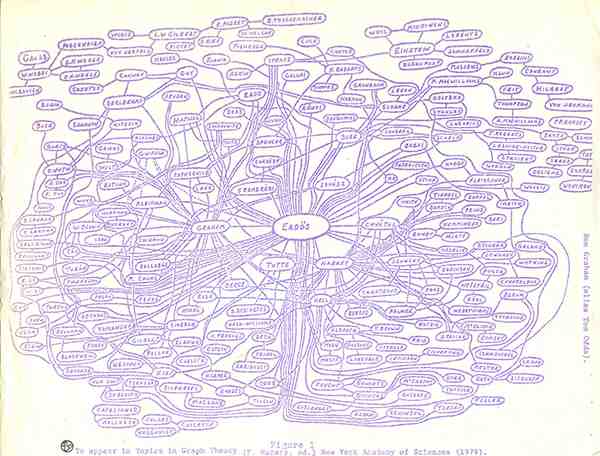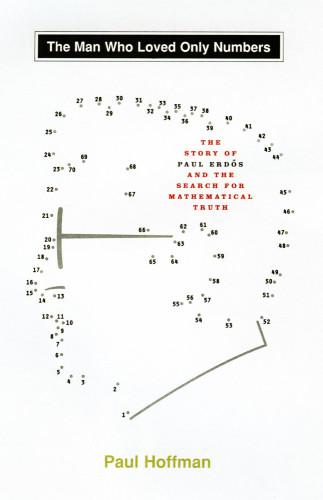Erdos: 3 Key Life Lessons You Can Learn From A Very Odd Mathematician
.By all accounts, Paul Erdos was a very odd guy…
If you were a friend he might show up at your house in the middle of the night wanting to do math and announce, “My brain is open.”
He wouldn’t do laundry. If he was staying with you, you had to do it for him.
If he wanted to work on a theorem at 5AM he’d bang pots and pans until you came downstairs.
He is also one of the world’s most accomplished mathematicians.
He collaborated with more people in the field of math than anyone who has ever lived and is recognized as the center of the mathematical world.
And people loved him because he brought out the best in them.
What made him weird made him great and what made him great made him weird.
This is what you can learn from him.
1) If you want to be the best, put in the hours.
Ever since Malcolm Gladwell’s Outliers: The Story of Success, people have been taken with the idea of 10,000 hours of practice being the threshold of expertise.
Paul Erdos makes that number look like a low-water mark.
Even in his 70’s, he often published more papers in a year than most solid mathematicians do in their entire lives.
Via The Man Who Loved Only Numbers: The Story of Paul Erdos and the Search for Mathematical Truth:
Before Erdos died, on September 20, 1996, at the age of eighty-three, he had managed to think about more problems than any other mathematician in history. He wrote or co-authored 1,475 academic papers, many of them monumental, and all of them substantial… Even in his seventies there were years when Erdos published fifty papers, which is more than most good mathematicians write in a lifetime.
In looking at the work habits of geniuses, there is one very consistent pattern: they never stop.
As Peter Winkler notes, this was definitely true of his friend.
Via The Man Who Loved Only Numbers: The Story of Paul Erdos and the Search for Mathematical Truth:
“Erdos came to my twins’ bar mitzvah, notebook in hand… It is entirely possible that he proved a theorem or two during the ceremony.”
As I’ve mentioned before, citing from Dan Pink’s To Sell Is Human, the most creative and successful people don’t just focus on good answers, they focus on good problems. Erdos was renowned for this.
Via The Man Who Loved Only Numbers: The Story of Paul Erdos and the Search for Mathematical Truth:
“He was the problem poser par excellence. His ability to formulate problems of any level of difficulty is legendary. Many people can ask questions which are impossibly difficult or trivially easy. It is given to few of us to tread the narrow path between triviality and unattainability…Erdos questions were always just right. So often when we are fumbling with our research, it is because we are not asking the right question…“
2) Networking is vital.
Ever heard of six degrees of Kevin Bacon? Paul Erdos is the Kevin Bacon of math.
This is no exaggeration. In fact, it’s barely a metaphor, it’s just fact.
Mathematicians often refer to their “Erdos number” — indicating how many degrees removed they are from having worked with him.
Via The Man Who Loved Only Numbers: The Story of Paul Erdos and the Search for Mathematical Truth:
With 485 co-authors, Erdos collaborated with more people than any other mathematician in history. Those lucky 485 are said to have an Erdos number of 1, a coveted code phrase in the mathematics world for having written a paper with the master himself. If your Erdos number is 2, it means you have published with someone who has published with Erdos. If your Erdos number is 3, you have published with someone who has published with someone who has published with Erdos. Einstein had an Erdos number of 2, and the highest known Erdos number of a working mathematician is 7.

It’s no joke. As Wayne Baker indicates in Achieving Success Through Social Capital, mathematicians put their Erdos numbers on their resumes.
How did he become the center of the math world?
He wasn’t a sleazy social climber. And given his eccentricities he was about as far from socially skilled as you can get.
He was a giver.
Via The Man Who Loved Only Numbers: The Story of Paul Erdos and the Search for Mathematical Truth:
Paul Erdos was one of those very special geniuses, the kind who comes along only once in a very long while yet he chose, quite consciously I am sure, to share mathematics with mere mortals — like me. And for this, I will always be grateful to him. I will miss the times he prowled my hallways at 4:00 AM and came to my bed to ask whether my “brain is open.” I will miss the problems and conjectures and the stimulating conversations about anything and everything. But most of all, I will just miss Paul, the human. I loved him dearly. – Tom Trotter
I’ve posted a lot about networking and as great networkers like Adam Rifkin advise, Paul Erdos gave to others. He made those around him better.
Via The Man Who Loved Only Numbers: The Story of Paul Erdos and the Search for Mathematical Truth:
He knew better than you yourself knew what you were capable of…He gave the confidence that many of us needed to embark on mathematical research.
Here’s a powerful anecdote from Hoffman’s book.
Via The Man Who Loved Only Numbers: The Story of Paul Erdos and the Search for Mathematical Truth:
In the late 1980’s Erdos heard of a promising high school student named Glen Whitney who wanted to study mathematics at Harvard but was a little short of the tuition. Erdos arranged to see him and, convinced of the young man’s talent, lent him $1,000. He asked Whitney to pay him back only when it would not cause him financial strain. A decade later Graham heard from Whitney, who at last had the money to repay Erdos. “Did Erdos expect me to pay interest?” Whitney wondered. “What should I do?” he asked Graham. Graham talked to Erdos. “Tell him,” Erdos said, “to do with the thousand dollars what I did.”
3) Find your passion.
Passion is often the spark that leads to expertise. And Erdos’ passion is also a major part of what made him the center of the math world.
He what he loved, and devoted his life to it.
Via The Man Who Loved Only Numbers: The Story of Paul Erdos and the Search for Mathematical Truth:
He lived out of a shabby suitcase and a drab orange plastic bag from Centrum Aruhaz (“Central Warehouse”), a large department store in Budapest. In a never-ending search for good mathematical problems and fresh mathematical talent, Erdos crisscrossed four continents at a frenzied pace, moving from one university or research center to the next. His modus operandi was to show up on the doorstep of a fellow mathematician, declare, “My brain is open,” work with his host for a day or two, until he was bored or his host was run down, and then move on to another home.
How deep did his passion go?
This is a guy who referred to children as “epsilon” because in mathematics epsilon is the Greek letter used for “small number.”
He had his own vocabulary, and it revolved around math.
Via The Man Who Loved Only Numbers: The Story of Paul Erdos and the Search for Mathematical Truth:
When he said someone had “died,” Erdos meant that the person had stopped doing mathematics. When he said someone had “left,” the person had died.
He made his passion the center of his life and never looked back.
Via The Man Who Loved Only Numbers: The Story of Paul Erdos and the Search for Mathematical Truth (quoting The Economist):
To find another life this century as intensely devoted to abstraction, one must reach back to Ludwig Wittgenstein (1889-1951), who stripped his life bare for philosophy. But whereas Wittgenstein discarded his family fortune as a form of self-torture, Mr. Erdos gave away most of the money he earned because he simply did not need it… And where Wittgenstein was driven by near suicidal compulsions, Mr. Erdos simply constructed his life to extract the maximum amount of happiness.
Is there anything better than to be great at what you do, at the center of a network of people who love and respect you, and to live a life passionately pursuing those things you find fascinating?
Via The Man Who Loved Only Numbers: The Story of Paul Erdos and the Search for Mathematical Truth
“I know numbers are beautiful. If they aren’t beautiful, nothing is. ” – Paul Erdos
You and I would be lucky indeed to have as weird and wonderful a life as Paul Erdos did.
Join 45K+ readers. Get a free weekly update via email here.
Related posts:
What is the single most important life lesson older people feel young people need to know?
What good work habits do nearly all geniuses have in common?





